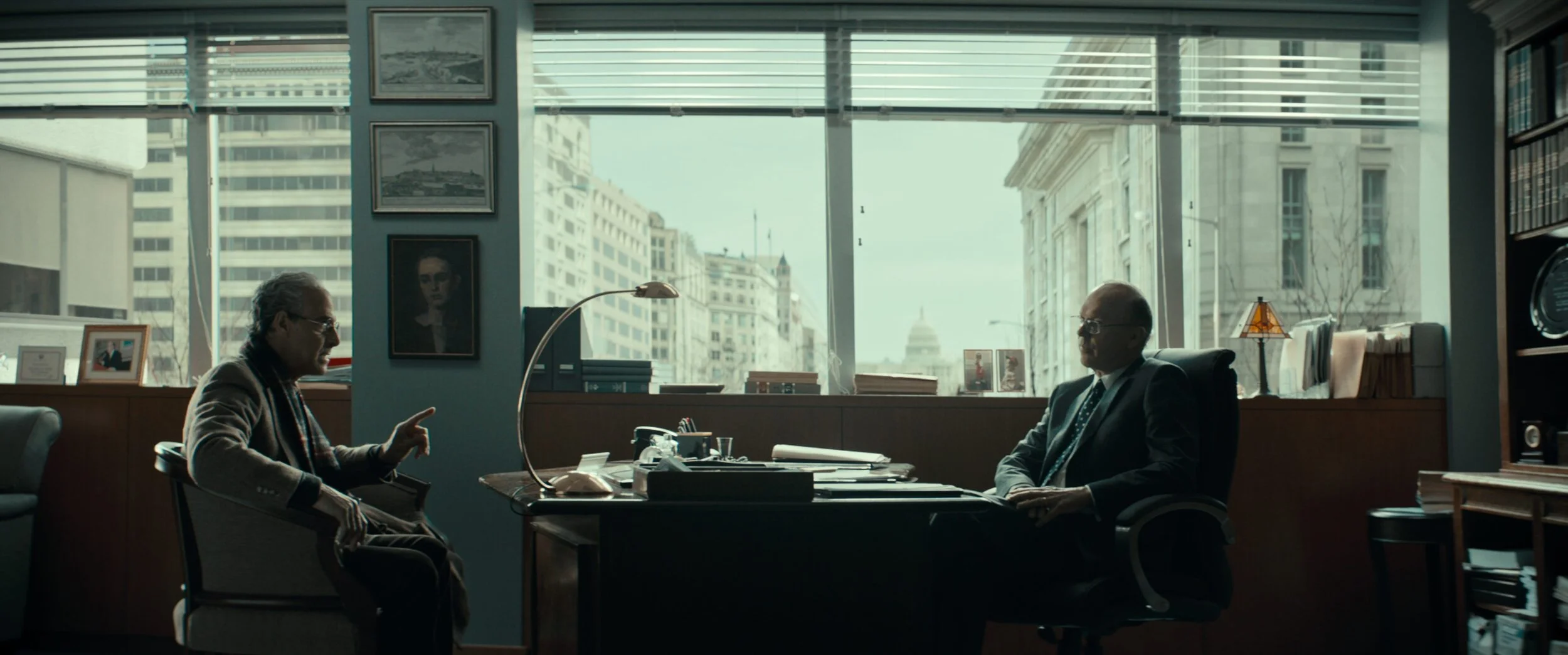WORTH
Directing: B+
Acting: A-
Writing: B+
Cinematography: B
Editing: B+
I very much liked Worth, even though I watched it with a huge amount of cynicism: how much of this is Hollywood fantasy, I wonder? And I mean that in an unusually literal way, because this movie is about as far fro “fantasy” as a genre as it could possibly be—it’s much more of a legal procedural, and an often rather sad one at that. (It has that, as well as its very straightforward tone, in common with 2015’s Spotlight, in which Michael Keaton and Stanley Tucci previously costarred.) What I’m talking about here, more specifically, is artistic license. Would the high-profile lawyer tasked with deciding the amount of money that should be offered the families of victims in 9/11 really be someone with such a deep moral compass?
Maybe he did. Who knows? It’s just that, in the post-Donald Trump age, in the middle of a pandemic in which literally millions of people are willfully ignoring the plight of their fellow Americans, it’s really difficult to imagine. Maybe that’s what makes Worth precisely the kind of movie we need right now. To a large degree, this whole movie is a two-hour lesson in empathy.
Indeed, among the many films that have now been made about or connected to the 9/11 terrorist attacks that occurred twenty years ago this month, Worth may very well be the best one made to date. It’s far from a masterpiece, it certainly has its imperfections, but it is also unusually affecting and effective. Maybe most importantly, it avoids any of the “disaster movie” trappings of some other films about the event, and moves briskly in the opposite direction. This isn’t about the attacks themselves, but about their long-lasting effectis, particularly the grief of the victims’ survivors.
I realize that makes it a hard sell. This isn’t the most uplifting experience. But, it’s a useful one, and an illuminating one. This movie illustrates how things are at once more complex than they first seem, but also that some solutions are simpler than we might want to admit. If you like more mature, “adult” dramas, this film is a great choice—and a ridiculously accessible one, available streaming on Netflix.
Rare is the film that addresses such sensitive subjects this gracefully. Even the requisite scene in which the 9/11 attacks are actually happening is effectively subtle: Michael Keaton’s Ken Feinberg slowly coming to the realization while riding a commuter train. We don’t even see the planes hit the building, but rather the smoke billowing into the sky in the distance as seen through his train window. Director Sara Colangelo does inject just a few clips of archival footage of the people of New York walking around in the ash of the fallen towers. But, we don’t see the planes hit them, or the towers actually falling. Even twenty years ago, Colangelo seems to understand that we have no need to relieve that collective trauma. We saw more than enough of that stuff many years ago.
What we see, instead, are many vignettes—one of which starts the film—of victims’ family members, talking about the loved ones they lost. It’s true, you’re going to want tissues handy when you watch this. The whole plot of Worth is about Feinberg’s firm, with the help of lawyers Camille Biros (Amy Ryan), Priya Khundi (Shunori Ramanathan) and more, trying to meet a Congressional deadline to get 80% of the potential claimants to sign on to the September 11th Victim Compensation Fun. Feinberg struggles for much of the film, to present the idea to all of these individuals in a way that comes across as empathetic rather than callous.
This leads me to my one burning question that Worth does not answer. Early on, this fund is presented as a necessary contingency to ward off potential lawsuits that could “sink the economy.” How true is that, I wonder? If there were no September 11 Victims Compensation Fund, and a bunch of victims’ families filed suit, against the airlines or the government or whoever, would it really have that cataclysmic effect on the U.S. economy? I suppose, maybe—we already know the terrorist attack events themselves severely hobbled the economy on their own. Still, it would be interesting to find out how plausible that scenario is, this idea that the Compensation Fund was a needed contingency lest the U.S. suffer a crash of the economy. This movie offers no concrete basis for the argument; characters just state it as though fact.
And, to be clear, the plot arc of Worth follows some Hollywood formula, with a bit of standard emotional manipulation. But, in its defense—and this movie is greatly deserving of defense—the most emotionally effective moments were not the ones with a character’s last-minute change of heart, or the triumph of meeting a critical deadline. Instead, it’s the individual stories, about the people who died on September 11 and their families. Worth includes an impressively large number of these details, all of them moving, and we know they still represent but a fraction of the thousands affected.
Feinberg finds a pseudo-nemesis in Charles Wolf (played by Tucci), whose argument is that the way the fund is initially (and for quite some time) designed is unjust. On a basic level, Worth is about the process of treating these people on a case by case basis, as individuals, rather than as numbers—and coming to a point where the fund is, as Wolf puts it, not perfect, but just. Worth is such an effective exercise in compassion and empathy, difficult as it sometimes is, we would all be better off if more of us gave movies like this the attention they deserve.
It’s a lot of talking, a fair amount of crying, and it’s more engaging than it looks.
Overall: B+

